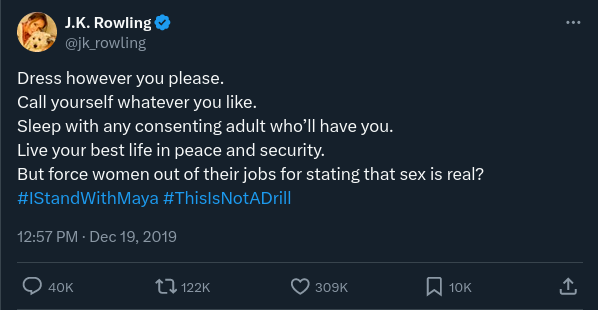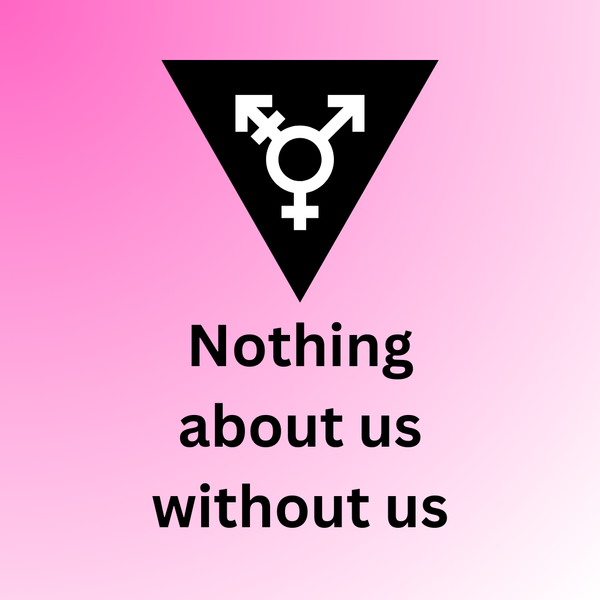Against polite transphobia: JK Rowling, the Sunday Times and Keir Starmer
JK Rowling’s recent decision to lash out at a trans woman for acting as a manager for a low level women’s football team has led to a lot…
JK Rowling’s recent decision to lash out at a trans woman for acting as a manager for a low level women’s football team has led to a lot of criticism, some of it from an unexpected source. The Sunday Times’ football columnist Martin Samuel described Rowling’s behaviour as a “gratuitous intrusion” (H/t to Lee Hurley for flagging on Twitter).
It felt a little unnecessary. Clark isn’t invading female space because if that’s the case, so is any coach not born female in the women’s game — and nobody complained about Marc Skinner steering Manchester United to the FA Cup. Clark has spoken about football saving her life when she considered suicide, so her involvement has been enormously positive. Rowling took down Scotland’s poorly-conceived gender reform laws in a series of whip-smart social media posts. By contrast, this just seemed gratuitous. — Martin Samuel, Man City’s four in a row is only boring if you think genius is a snooze, Sunday Times
This intervention surprised a few of us in trans circles because the Sunday Times is not exactly known for its trans positive editorial policy, so what’s going on here? Samuel’s short criticism of Rowling gives us a few clues; his defence of Lucy Clark is made on the basis that she is not “invading female space,” which leaves one wondering if he thinks it would have been acceptable for a multimillionaire celebrity to publicly attack a random member of the public if she had been doing such a thing.
“Invading female space” is a common dog whistle in contemporary transphobia (and specifically transmisogyny), used to attack trans women who are perceived as stepping out of place. We “invad[e] female space” when we use public toilets (something necessary to fully participate in public life) or when we access sexual or domestic violence services (something we do because we have been the victims of sexual or domestic violence and need support, just like any other woman in the same situation).
What Samuel is saying, in essence, is that trans women are allowed to be managers of low level women’s football teams, as long as we aren’t so audacious as to expect to be allowed to participate in public life as equals or have equal access to public services. What Samuel is perpetuating is a kind of polite transphobia; a belief that it’s acceptable for trans people to be marginalised and discriminated against, as long as you’re nice and, above all, polite about it.
A lot of cis people engage in polite transphobia and when they do so, they don’t think they’re being transphobic at all. Rowling herself has previously indulged in this with her now famous “dress however you please” Tweet in defence of the “sex is real” dog whistle (and, according to some commentators, supporting “hostile work environments”), a post that is often cited by her defenders as evidence that she isn’t transphobic at all.

The logic here is quite straightforward. If transphobia is when you hate trans people, then surely no political position on trans people’s rights can be transphobic as long as you don’t feel visceral hatred in your heart (or at least as long as you don’t express any such hatred). This is a view of transphobia that centres the perspectives of cis people first and foremost, transphobia existing not in how trans people are treated but in what cis people think about us.
As a thought experiment, you might imagine a policy that explicitly says that no trans person could work as a teacher. I would think that most people (or at least any person whose opinion I would care about) would understand this policy as discriminatory against trans people and so transphobic. It would remain transphobic even if it were instituted and carried out within an institution where no individual person felt hatred towards trans people as a group. From this we can get an understanding of transphobia that centres trans experience; transphobia is that which does harm to trans people because we are trans. It harms trans people when we are excluded from vital public services like sexual violence support, it harms trans people when the fact of our normal use of public space is framed as a violent invasion. The harm remains even if you’re polite about it or concede, in your beneficence, that we’re allowed to work as football managers or pick our own outfits.
This kind of polite transphobia, defending harm or discrimination against trans people while maintaining an aesthetic of politeness and reason, has become particularly important to understand as we face the increasing likelihood of a Labour government led by Keir Starmer. Starmer’s relationship with trans communities has been increasingly fraught as he has sought to avoid negative headlines by prevaricating on trans issues, making rhetorical concessions to transphobia or just outright backing trans exclusion while his party backs off previous promises to meaningfully reform the Gender Recognition Act by demedicalising the process.
I don’t think that Starmer sees any of this as transphobic or that it would even matter if he did, in the depths of his soul, feel hatred towards trans people. Indeed, Starmer was vocally critical of Rishi Sunak for making a transphobic jibe in Parliament in the presence of Esther Ghey, mother of murdered trans girl Brianna Ghey. Making such a jibe in that context is crass, it is rude, it is impolite. Starmer’s outrage has not been forthcoming on the many, many other occasions that Sunak has made the exact same jibe because the problem for Starmer is not the transphobia, it’s the rudeness. This polite transphobia can be seen in other senior Labour figures with Shadow Secretary for Women and Equalities Anneliese Dodds claiming in public to oppose transphobia while holding “productive” meetings with anti-trans hate groups.
After the next general election, we will likely see a Labour government. Polite transphobia will soon be government policy. We have to be ready to be rude about it.


